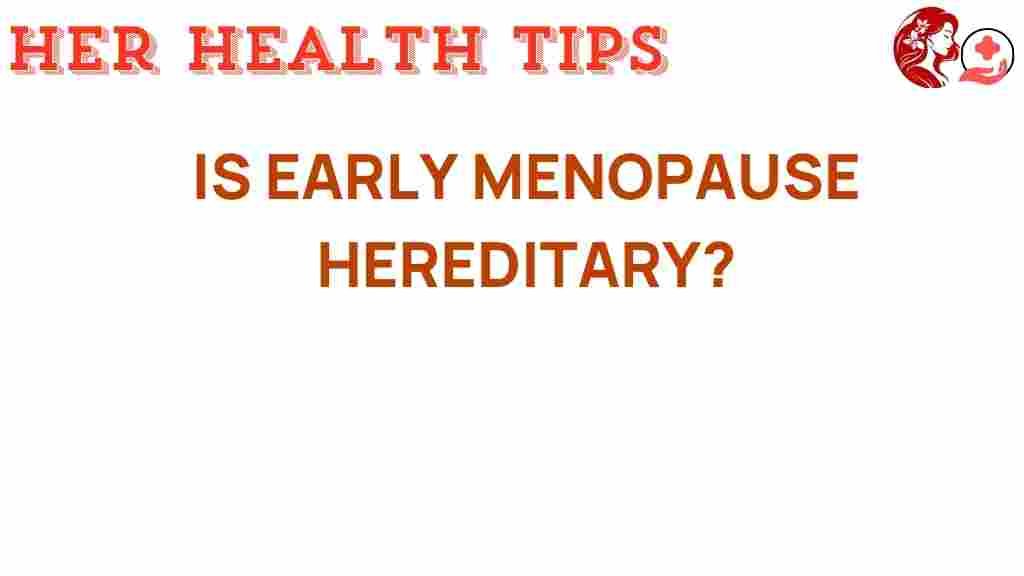Unraveling the Mystery: Is Early Menopause Hereditary?
Menopause is a natural biological process that signifies the end of a woman’s reproductive years. While it typically occurs between the ages of 45 and 55, some women experience early menopause, which can happen before the age of 45. The experience of early menopause can raise various questions, particularly regarding its causes and whether there is a hereditary component. In this article, we will explore the connection between early menopause and hereditary factors, shedding light on genetic predisposition, family history, and how these aspects relate to women’s health.
Understanding Early Menopause
Early menopause, defined as menopause occurring before the age of 45, can be an emotional and physical challenge for many women. It marks the cessation of menstrual cycles and leads to hormonal changes that can significantly impact a woman’s health and quality of life. Common symptoms of early menopause include:
- Hot flashes
- Night sweats
- Irregular periods
- Vaginal dryness
- Mood swings
Understanding the underlying causes of early menopause is crucial for addressing the concerns that arise with this condition. One of the key areas of research focuses on the hereditary factors that may contribute to its onset.
Hereditary Factors Influencing Early Menopause
Research indicates that genetics can play a significant role in the age at which a woman experiences menopause. Family history is a strong indicator of reproductive health, and women with relatives who experienced early menopause may also be at a higher risk. Here are some of the hereditary factors that can influence early menopause:
- Family History: Women with mothers or sisters who had early menopause are more likely to experience it themselves.
- Genetic Predisposition: Certain genetic markers have been identified that may contribute to the timing of menopause.
- Chromosomal Abnormalities: Conditions like Turner syndrome can lead to premature ovarian failure and early menopause.
Studies suggest that approximately 20% of women may have a hereditary predisposition to early menopause, indicating that genetics can be a significant factor in determining menopause age.
The Role of Hormonal Changes
The onset of early menopause is closely linked to hormonal changes in a woman’s body. Hormones like estrogen and progesterone are crucial for regulating the menstrual cycle and reproductive health. When the ovaries begin to produce less of these hormones, it can lead to early menopause. Factors that can influence these hormonal changes include:
- Genetic Factors: As mentioned, a genetic predisposition can affect hormone production.
- Autoimmune Disorders: Conditions like lupus or rheumatoid arthritis can lead to premature ovarian failure.
- Environmental Factors: Exposure to certain toxins and chemicals can impact hormone levels.
Understanding how these hormonal changes interact with hereditary factors can provide insights into women’s health and reproductive health.
Research Studies on Early Menopause and Genetics
Various studies have explored the link between genetics and early menopause. A notable study published in NCBI found that women with a family history of early menopause were more likely to experience it themselves. Additionally, researchers have identified specific genes associated with the timing of menopause, such as the BRCA1 and BRCA2 genes, which are often discussed in the context of breast cancer risk.
Further investigations are ongoing to better understand the genetic components influencing menopause age. This research is crucial as it can lead to improved screening and management strategies for women at risk of early menopause.
Step-by-Step Process: How to Assess Your Risk
If you are concerned about early menopause and its hereditary factors, consider taking the following steps:
- Evaluate Family History: Talk to your family members about their experiences with menopause. Understanding your family history can provide valuable insights.
- Consult a Healthcare Professional: Schedule an appointment with your doctor to discuss your concerns, especially if you have symptoms of early menopause.
- Genetic Testing: Consider genetic counseling or testing if there is a strong family history of early menopause or related conditions.
- Monitor Hormonal Levels: Work with your doctor to monitor your hormone levels through blood tests, which can help assess your reproductive health.
Troubleshooting Tips for Managing Early Menopause
Managing the symptoms of early menopause can be challenging, but there are several strategies you can employ to alleviate discomfort:
- Hormone Replacement Therapy (HRT): Discuss the possibility of HRT with your doctor. This treatment can help balance hormone levels and alleviate symptoms.
- Lifestyle Modifications: Incorporate regular exercise, a balanced diet, and stress management techniques to improve overall well-being.
- Support Groups: Consider joining support groups for women experiencing early menopause. Sharing experiences can provide emotional support and practical advice.
- Regular Check-ups: Maintain regular visits with your healthcare provider to monitor your health and manage any arising concerns.
Conclusion: Understanding Your Health
Unraveling the mystery of early menopause and its hereditary components is crucial for women’s health. While genetics can play a significant role in determining menopause age, it is essential to consider the various factors that contribute to reproductive health. By understanding your family history, consulting healthcare professionals, and monitoring your hormonal changes, you can take proactive steps to manage early menopause.
As research continues to evolve, women may gain further insights into the hereditary risks associated with early menopause, leading to better health outcomes and support systems. If you suspect you may be at risk, do not hesitate to reach out to a healthcare provider for guidance and support.
For more information about menopause and women’s health, visit WomensHealth.gov for reliable resources and support.
This article is in the category Reproductive and created by HerHealthTips Team
